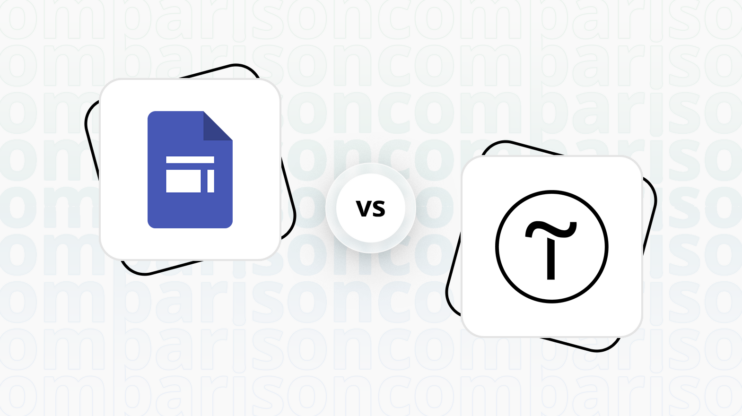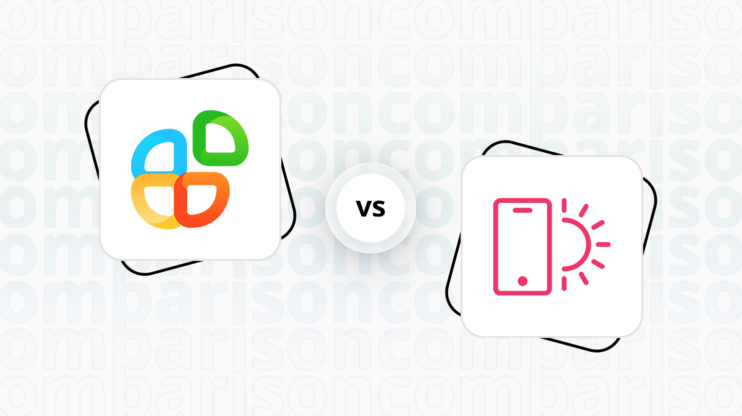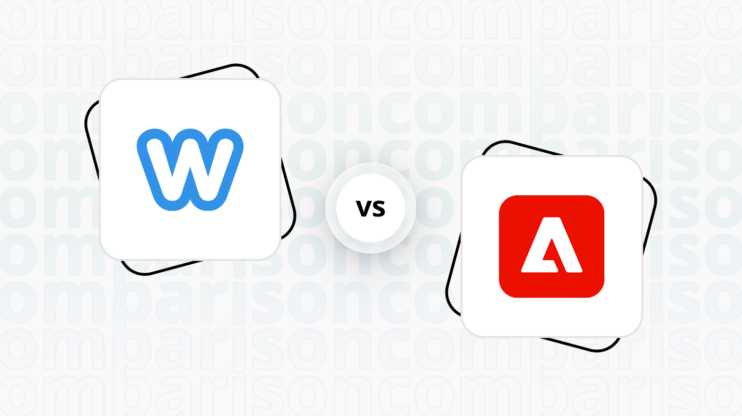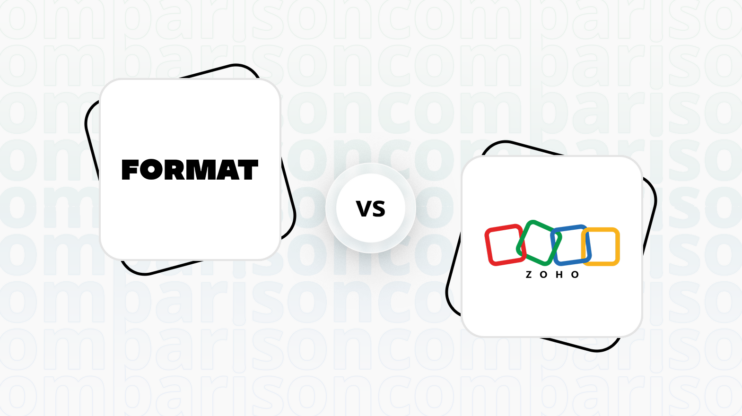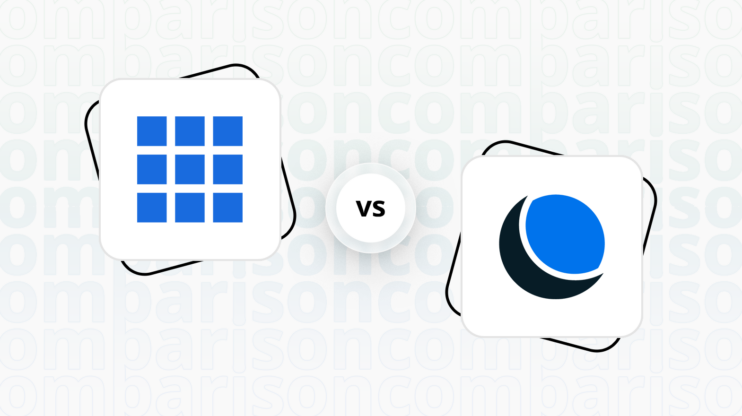Final verdict
Elementor and Yola both offer unique strengths, catering to different user needs and preferences.
-
Elementor (Overall Grade: 7.4/10)
is a powerful website builder plugin for WordPress, known for its flexibility and extensive customization options. It excels in design functionalities, ease of use, and integration with various marketing tools and plugins. Elementor is ideal for users who want to create highly customized websites with advanced features, making it suitable for both beginners and professional web designers. When comparing Elementor vs Yola, Elementor stands out for its robust ecommerce capabilities and superior user management features. -
Yola (Overall Grade: 6.5/10)
is a user-friendly website builder designed for individuals and small businesses. It offers a straightforward drag-and-drop interface, making it easy to create professional-looking websites without advanced technical skills. Yola provides a variety of templates and essential features like SEO tools and e-commerce capabilities. Considering Elementor vs Yola, Yola is a great choice for users who prioritize ease of use and affordability, especially for creating and managing simple websites.

|

|
|
|---|---|---|
|
Design functionalities & templates |
9.2 |
7.2 |
|
Ease of use |
8.8 |
8.0 |
|
Ecommerce |
7.6 |
5.7 |
|
Website Editors |
8.5 |
6.7 |
|
Product testing options |
5.6 |
7.5 |
|
Price |
8.0 |
8.1 |
|
Hosting quality |
7.8 |
7.2 |
|
Website speed optimization |
6.7 |
7.5 |
|
Plugins and integrations |
7.6 |
6.3 |
|
Marketing features |
7.8 |
6.5 |
|
Customer support |
7.2 |
6.3 |
|
Security |
9.1 |
8.3 |
|
AI capabilities |
7.4 |
0.0 |
|
User Management |
8.8 |
7.3 |
Best for ecommerce
 7.6
7.6
 5.7
5.7
Verdict
: Elementor is more suitable for those looking for extensive customization and integration with WooCommerce, while Yola is better for simpler, small-scale ecommerce needs.
-
Elementor
: Known for its flexibility and integration with WooCommerce, Elementor offers a wide range of ecommerce-specific widgets and templates. It allows for extensive customization of product pages and supports various payment gateways. However, when comparing Elementor vs Yola, Elementor might be more complex for beginners due to its advanced features. -
Yola
: Its user-friendly drag-and-drop interface is perfect for those starting out. The platform offers essential ecommerce features like shipping configurations and product catalog management. However, it may fall short in terms of scalability and advanced customization options compared to Elementor.
Best for informational & business websites
 8.9
8.9
 7.4
7.4
Verdict
: Elementor is the superior choice for creating informational and business websites, thanks to its extensive customization options and user-friendly interface. Yola, while capable, falls short in comparison, particularly in terms of design flexibility and advanced features.
-
Elementor
: Elementor excels in providing a highly customizable and flexible platform for building informational and business websites. With a score of 8.9, it offers a wide range of templates and widgets, making it easy to create visually appealing and functional websites without any coding knowledge. Its drag-and-drop interface, combined with responsive design capabilities, ensures that websites look great on all devices. Elementor’s integration with WordPress themes and plugins further enhances its versatility, making it a top choice for both beginners and professional web designers. -
Yola
: Yola is a user-friendly website builder designed for individuals and small businesses looking to create professional-looking websites without advanced technical skills. Scoring 7.4, Yola offers a drag-and-drop interface and a variety of responsive templates, making it easy to customize web pages. While it includes features such as SEO tools and e-commerce capabilities, Yola lacks the extensive customization options and advanced design functionalities provided by Elementor. For those prioritizing ease of use over flexibility, Yola remains a viable option, but it doesn’t quite match up to Elementor’s capabilities in the Elementor vs Yola comparison.
Detailed comparison
Design functionalities & templates
Design FunctionalitiesRepresents how well each platform allows for creative design and customization of websites.Score Components:
- Template Variety (30%): Range and quality of design templates.
- Customization (30%): Flexibility and options for design alterations.
- User Interface (20%): Ease and intuitiveness of the design process.
- Responsiveness (10%): Adaptability to different devices and screen sizes.
- Innovation (10%): Unique design features and tools.
 9.2
9.2
 7.2
7.2
🏆
Winner: Elementor.
Elementor offers a wider range of templates and designs, more customization flexibility, and more creative design possibilities than Yola.
Elementor offers an extensive range of templates and designs, with over 100 responsive website kits covering various categories like business, creative, education, and more, directly available through Elementor’s platform. Additional sources like Envato Elements, Template Monster, and others provide a wider selection, including free and premium options, catering to diverse web design needs.
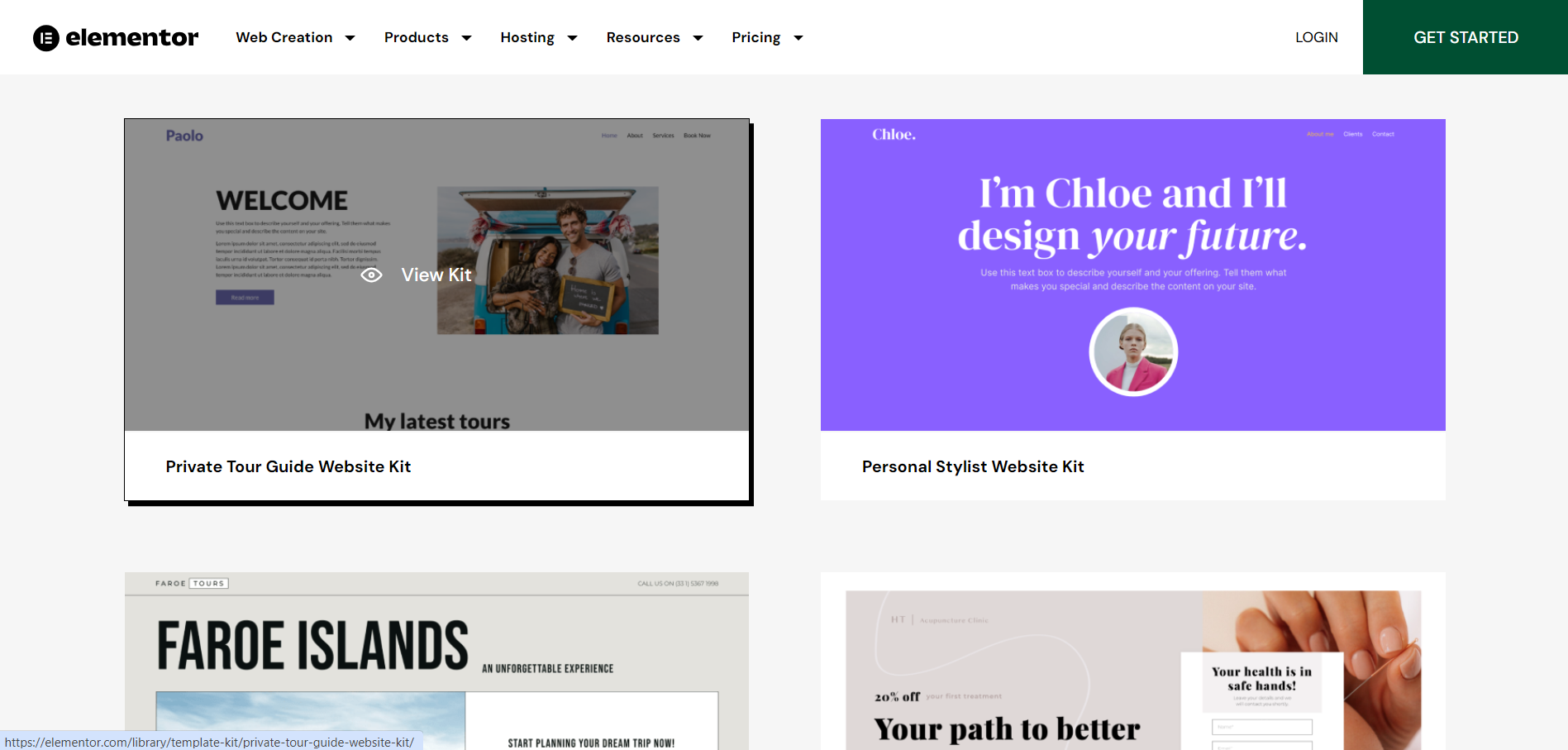

On the other hand, Yola offers a diverse range of templates and designs, catering to various types of websites, from personal blogs to professional business sites. Users can choose from a wide selection of themes, each customizable to fit their specific needs and preferences. With hundreds of templates available, Yola ensures that there is something for everyone, regardless of their niche or industry.


Get a head start on website creation with AI
Create a custom website tailored to your business needs 10X faster with 10Web AI Website Builder!
Ease of use
Ease of useReflects the platform’s overall user-friendliness.Score
Components:
- Learning curve (40%): Quickness and ease of getting started.
- Interface design (30%): Simplicity and intuitiveness of layout.
- User guidance (20%): Quality of tutorials and support.
- Flexibility (10%): Adaptability to various user skills.
 8.8
8.8
 8.0
8.0
🏆 Winner: Elementor
. Scoring an impressive 8.8, Elementor is known for its user-friendly interface and flexibility, making it easy for both beginners and professional web designers to create and customize their websites. Yola, with a score of 8.0, also offers a user-friendly platform but lacks the extensive customization options provided by Elementor. If ease of use and flexibility are a priority, Elementor is the clear winner in this category.
Learning Resources
🏆 Winner: Elementor
. Both platforms offer solid learning resources, but Elementor goes a step further with its Elementor Academy and extensive community of users, making it easier for users to learn and adapt.
For ecommerce
EcommerceMeasures the platform’s effectiveness in supporting online business activities.Score Components:
- Ecommerce themes and templates (20%): Variety and design of templates.
- Product management (25%): Ease of managing and organizing products.
- Payment options (25%): Variety and convenience of payment methods.
- Ecommerce features (20%): Features for managing an ecommerce store.
- Integration (10%): Compatibility with external e-commerce tools and services.
 7.6
7.6
 5.7
5.7
Elementor and Yola both offer ecommerce capabilities, but they cater to different needs and have their own strengths and limitations.

|

|
|
|---|---|---|
|
Ecommerce themes and templates |
7.8 |
5.5 |
|
Product page customization |
8.4 |
6.8 |
|
Payment processing and commissions |
7.5 |
7.0 |
|
POS capabilities |
5.5 |
4.5 |
|
Payment gateways |
7.0 |
7.5 |
|
Product numbers |
7.0 |
7.0 |
|
Additional ecommerce features |
8.0 |
6.0 |
Elementor ecommerce features:
- WooCommerce Integration
- Customizable Product Pages
- Ecommerce Widgets
- Product Categories and Filters
- Shopping Cart Customization
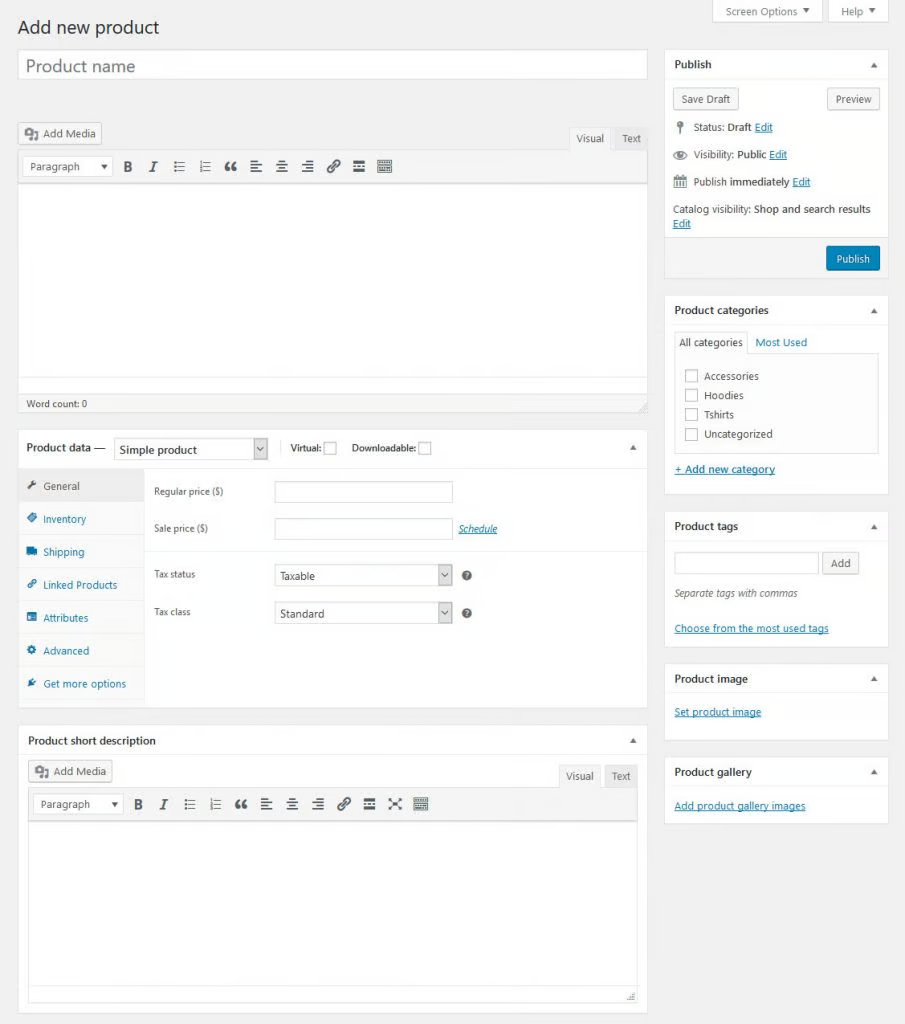
Yola ecommerce features:
- Shipping and Tax configurations
- Product Catalog Management
- Ability to checkout as guest
- Analytics and reporting
- Promotions features
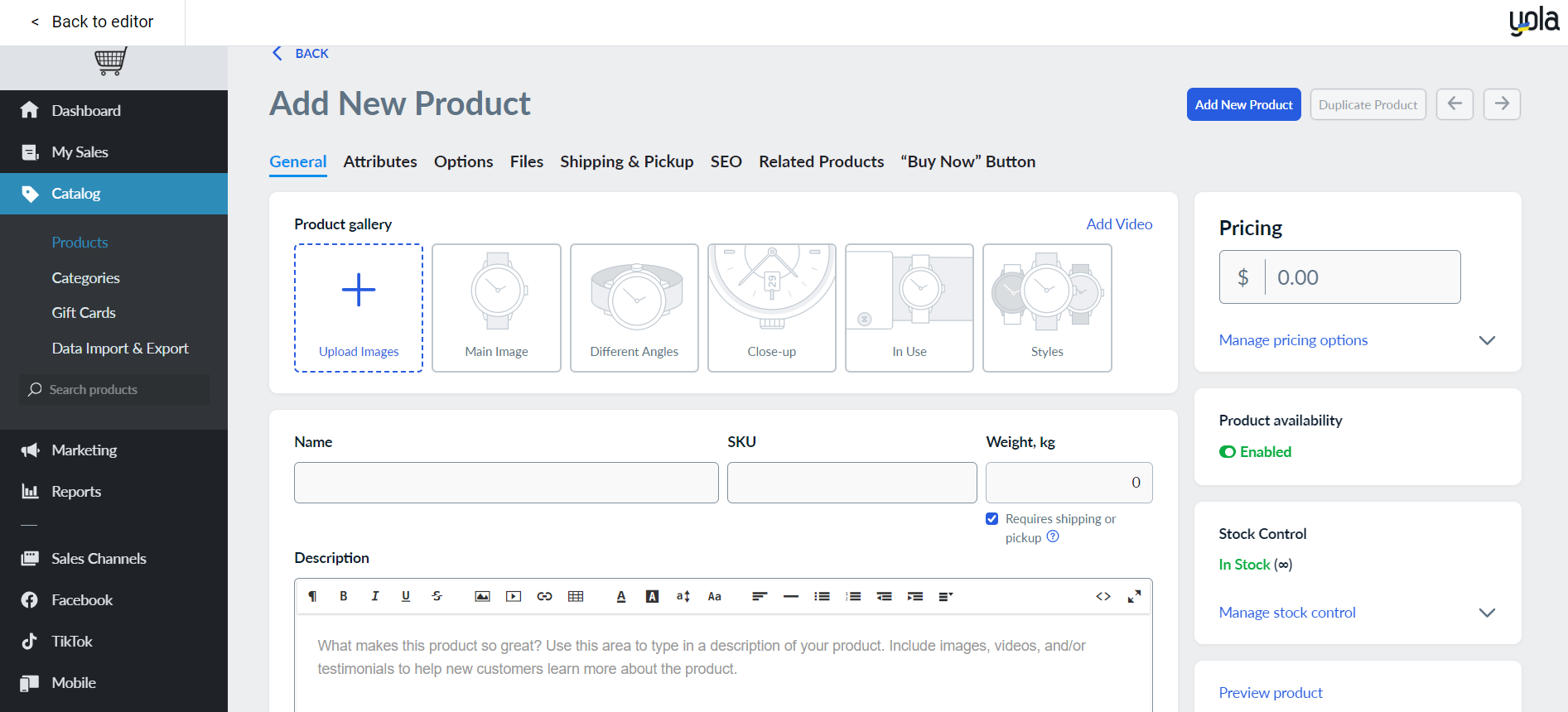
Ecommerce themes & templates
Elementor offers a diverse range of ecommerce-specific templates suitable for various online stores. These templates are designed to be mobile-responsive and SEO-friendly, ensuring optimal performance across devices and search engines. On the other hand, Yola offers a range of templates for building websites, including those suitable for ecommerce, but the variety and design quality may not match those provided by other leading website builders.
Product page customization
Elementor offers extensive customization options for WooCommerce product pages, including custom layouts, WooCommerce widgets for various product elements, and options for styling product galleries and ‘Add to Cart’ buttons. Yola’s eCommerce platform offers a variety of customization options for your product pages, including the ability to manage product options and combinations.
Payment processing
Elementor supports several payment gateways, notably through plugins and integrations, with Stripe and PayPal being prominent options for simple and widespread use. Yola supports various payment gateways for online store transactions, such as PayPal, Sage Payments, and American Express, allowing users to choose based on their specific needs, including geographical availability and fee structure.
In conclusion, Elementor offers robust ecommerce capabilities through its seamless integration with WooCommerce, providing customizable product pages, a variety of ecommerce-specific widgets, and responsive design templates for building online stores. Yola provides an easy-to-use, drag-and-drop website builder with ecommerce capabilities through an integration with Ecwid, allowing for the sale of up to 1000 products without transaction fees and supporting multiple currencies and payment services. However, its ecommerce features may be limited by the lack of tiered options for scalability and a conventional CMS dashboard, as well as the absence of a marketplace for extensions and plugins.
Website Editors
Website EditorsEvaluates the platforms’ website building and editing capabilities.Score Components:
- Customization tools (40%): Range and power of editing features.
- Editor usability (30%): User experience within the editor.
- Design flexibility (20%): Freedom in layout and design changes.
- Update and maintenance ease (10%): Simplicity of updating and maintaining the site.
 8.5
8.5
 6.7
6.7
🏆
Winner: Elementor
. Elementor, with a score of 8.5, offers a drag-and-drop interface that makes it easy to customize layouts, add content, and style websites visually in real-time. With a wide array of widgets and templates, users can effortlessly design complex elements such as sliders, forms, and animated headlines. Additionally, Elementor provides responsive design options, ensuring websites look great on all devices, alongside advanced features like custom CSS, role-based access control, and integration with a variety of marketing tools.
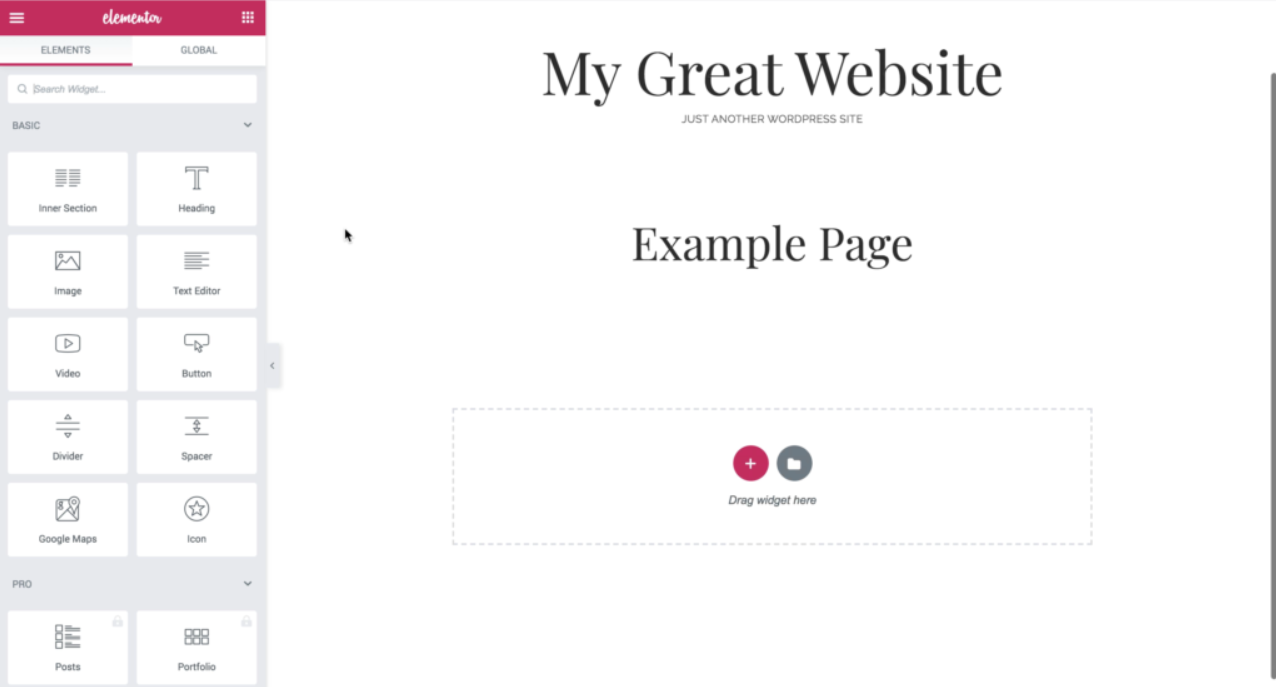
Yola’s website builder editor, scoring 6.7, is designed for ease of use, allowing users to create professional-looking websites without needing coding knowledge. It offers a drag-and-drop interface, enabling users to easily add, customize, and position elements like text, images, and buttons on their web pages. The editor also provides access to a wide range of templates and customization options, including color schemes, fonts, and page layouts, to help users achieve their desired website look and feel. Additionally, Yola supports responsive design, ensuring websites look great on both desktop and mobile devices.
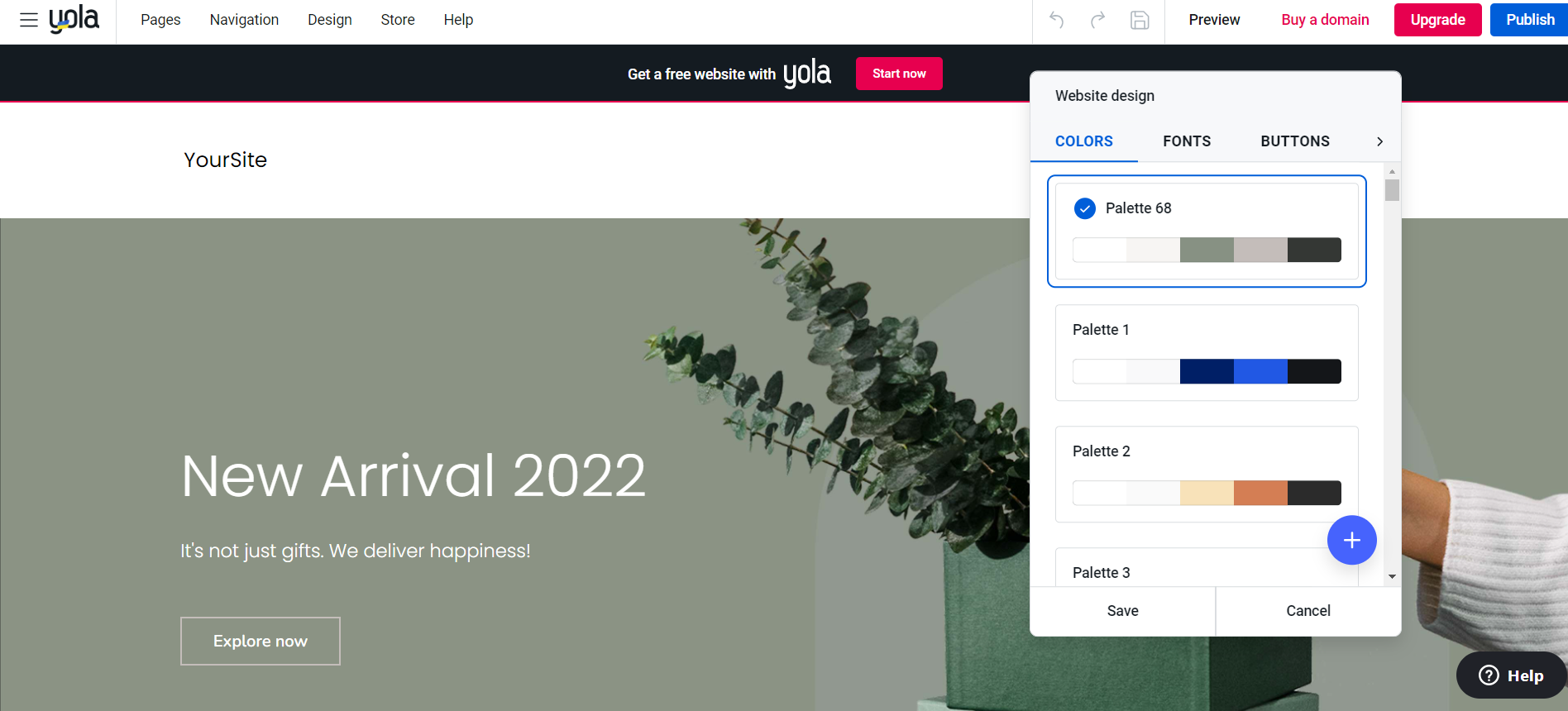
Mobile editor/app
 0
0
 4.5
4.5
🏆
Winner: Yola
. Both Elementor and Yola do not have a dedicated mobile editor app. However, Yola allows for some small changes using a mobile browser, giving it a slight edge over Elementor, which does not offer any mobile editing capabilities. Therefore, if you need to make quick changes to your website on the go, Yola might be a better choice.
Product testing options
Product Testing OptionsAssesses the options for trying out platform features before commitment.Score Components:
- Trial quality (40%): Extent and usefulness of the trial or free version.
- Feature accessibility (30%): How many features are available to test.
- Trial duration (20%): Length of the trial period.
- Ease of transition (10%): Smoothness of moving from trial to paid plans.
 5.6
5.6
 7.5
7.5
Overall Result
:
Yola wins
. Yola scores 7.5, while Elementor scores 5.6 in product testing options. Both Elementor and Yola offer a free version, but neither provides a trial version. However, both allow testing of premium features during a refundable period. They also both offer a 30-day money-back guarantee.

|

|
|
|---|---|---|
|
Free Plan |
Yes, but only for self-hosted WordPress.org |
Yes |
|
Trial Duration |
No | No |
|
Testing Premium Features |
Possible during the refundable period | Possible during the 30-day refundable period |
|
Money-Back Guarantee |
30-day money back guarantee | 30-day money back guarantee |
Price
PriceLooks at the cost-effectiveness and value for money of each platform.Score Components:
- Plan value (40%): What each pricing tier offers.
- Transparency and clarity (30%): Clearness of pricing structures.
- Flexibility of plans (20%): Range of options to suit different budgets.
- Hidden costs (10%): Additional expenses not included in the plan.
 8.0
8.0
 8.1
8.1
Elementor and Yola have similar pricing scores, indicating that they offer comparable value for money.
| Price range |

|

|
|---|---|---|
|
Free |
No offering at this amount. |
Free (Website) ($0/month): Basic features with Yola subdomain, suitable for starting a simple site. With possibility to have up to 2 websites and 2 page limit. Free (Online Store Add-on) ($0/month): Launch an online store with basic features and a limited number of products. Available as an add-on to a website plan. |
|
$0-$10 |
Basic ($9.99/month): 1 website, with 10GB SSD storage, 25k monthly visitors, 30GB monthly bandwidth, daily auto backups stored for 14 days, Cloudflare CDN, and integrated caching tool Value for price: 6.5 |
Bronze (Website) ($9.45/month): More resources and features, including unlimited pages and bandwidth. With possibility to have up to 5 websites. Value for price: 7.5 |
|
$10-$15 |
No offering at this amount. |
Basic (Online Store Add-on) ($15.00/month): Includes inventory tracking, order management, and the ability to sell on Facebook. Available as an add-on to a website plan. Value for price: 7.0 |
|
$15-$20 |
Business ($19.99/month): 1 website, with 20GB SSD storage, 50k monthly visitors, 50GB monthly bandwidth, daily auto backups stored for 30 days, Cloudflare CDN, integrated caching tool and access to staging environment Value for price: 7.5 |
Silver (Website) ($18.95/month): Advanced design features and site customization options. With possibility to have up to 25 websites. Value for price: 8.0 |
|
$20-$35 |
Grow ($22.99/month): 3 websites, with 30GB SSD storage, 75k monthly visitors, 75GB monthly bandwidth, daily auto backups stored for 30 days, Cloudflare CDN, integrated caching tool, access to staging environment and site cloning Value for price: 8.5 |
Professional (Online Store Add-on) ($35.00/month): Advanced features including discount coupons, product filters, and sales on multiple platforms like Facebook and Instagram. Available as an add-on to a website plan. Value for price: 8.0 |
|
$35-$50 |
Scale ($49.99/month): 10 websites, with 40GB SSD storage, 100k monthly visitors, 100GB monthly bandwidth, daily auto backups stored for 30 days, Cloudflare CDN, integrated caching tool, access to staging environment and site cloning Value for price: 9.0 |
Gold (Website) ($35.45/month): Comprehensive plan with unlimited storage and advanced SEO tools. With possibility to have up to 25 websites. Value for price: 8.5 |
|
$90+ |
No offering at this amount. |
Unlimited (Online Store Add-on) ($99.00/month): The most extensive plan offering a vast product catalog, point of sale integrations, and more, for expanding online business. Available as an add-on to a website plan. Value for Price: 9.0 |
location. As a result in rare cases the prices displayed here can differ from the ones you see on their
websites.
Hosting quality
Hosting
qualityExamines the reliability and performance of the hosting solutions.Score Components:
- Uptime (40%): Consistency and reliability of website availability.
- Speed (30%): Loading times and performance.
- Bandwidth and storage (20%): Sufficiency of resources provided.
- Data centers (10%): Quality and distribution of hosting infrastructure.
 7.8
7.8
 7.2
7.2
🏆
Winner: Elementor
Both Elementor and Yola offer managed hosting with a 99.9% uptime guarantee. However, Elementor’s Google Cloud powered hosting with 10-40GB SSD storage and daily auto backups gives it an edge over Yola’s hosting with storage from 1GB on the free plan and up to unlimited on the highest plan.

|

|
|
|---|---|---|
|
Do they offer hosting? |
Yes, included in all their plans |
Yes, included in all their plans |
|
Data Centers: |
1 data center in Belgium |
5 data centers located in US and EU |
|
Type of hosting: |
Managed WordPress Hosting |
Managed Cloud Hosting |
|
Uptime: |
99.9% |
99.9% |
|
Uptime Guarantee: |
Yes, 99.9% |
Yes, 99.9% |
Website Speed Optimization
Website Speed OptimizationEvaluates optimization of website loading timesScore Components:
- PageSpeed Score (30%): Google’s score indicating performance optimization.
- Loading Time (30%): The average time until a website is fully interactive.
- Mobile Optimization (15%): Optimization effectiveness for mobile devices.
- Resource Optimization (15%): Optimizing images, scripts, and other heavy resources.
- CDN Usage (10%): Use of CDN to enhance speed across geolocations.
 6.7
6.7
 7.5
7.5
🏆 Winner: Yola
Both Elementor and Yola prioritize website performance and page speed, but Yola has a slight edge due to its comprehensive speed optimization strategies and emphasis on Core Web Vital improvements.

|

|
|
|---|---|---|
|
Focus |
Lazy Loading, Code Minification, Caching, CDN |
CDN, Caching, Code Minifcation, Server response time improvements, Image optimization |
|
Performance Tools |
Not specified |
Not specified |
|
Key Strategies |
Lazy Loading, Code Minification, Caching, CDN |
CDN, Caching, Code Minifcation, Server response time improvements, Image optimization |
|
Load Times |
Varies depending on optimization and website complexity |
Varies depending on the optimization, website complexity |
|
Page Speed Scores Range |
Varies depending on optimization and website complexity |
Varies depending on the optimization, website complexity |
|
Core Web Vitals Improvement |
Not disclosed |
Emphasis on LCP, FID, CLS improvements |
Elementor, a popular website builder plugin for WordPress, focuses on speed optimization strategies such as lazy loading, code minification, caching, and CDN. However, it does not disclose any information about its Core Web Vitals improvements. The load times and PageSpeed scores vary depending on the optimization and website complexity.
On the other hand, Yola, a user-friendly website builder, employs a comprehensive set of speed optimization strategies, including CDN, caching, code minification, server response time improvements, and image optimization. It also places an emphasis on Core Web Vitals improvements, specifically LCP, FID, and CLS. Similar to Elementor, Yola’s load times and PageSpeed scores vary widely, depending on the optimization and website complexity.
Get a head start on website creation with AI
Create a custom website tailored to your business needs 10X faster with 10Web AI Website Builder!
Plugins and integrations
Plugins and integrationsMeasures the range and effectiveness of additional plugins and integrations.Score Components:
- Variety of options (40%): Range of available add-ons.
- Integration smoothness (30%): Ease of integrating plugins into the site.
- Quality of plugins (20%): Functionality and reliability of the options.
- Custom integration capabilities (10%): Support for custom or third-party integrations.
 7.6
7.6
 6.3
6.3
🏆 Winner: Elementor.
With a score of 7.6, Elementor leads the way with its wide range of add-ons and integrations that extend the functionality of the base version. It offers both free and premium options, providing advanced features such as theme building, dynamic content, and extensive widget libraries.
Yola, scoring 6.3, also supports a variety of functionalities through plugins and apps, including social media integration, e-commerce tools, and marketing enhancements. However, Elementor’s superior integration with WooCommerce and third-party services gives it the edge.
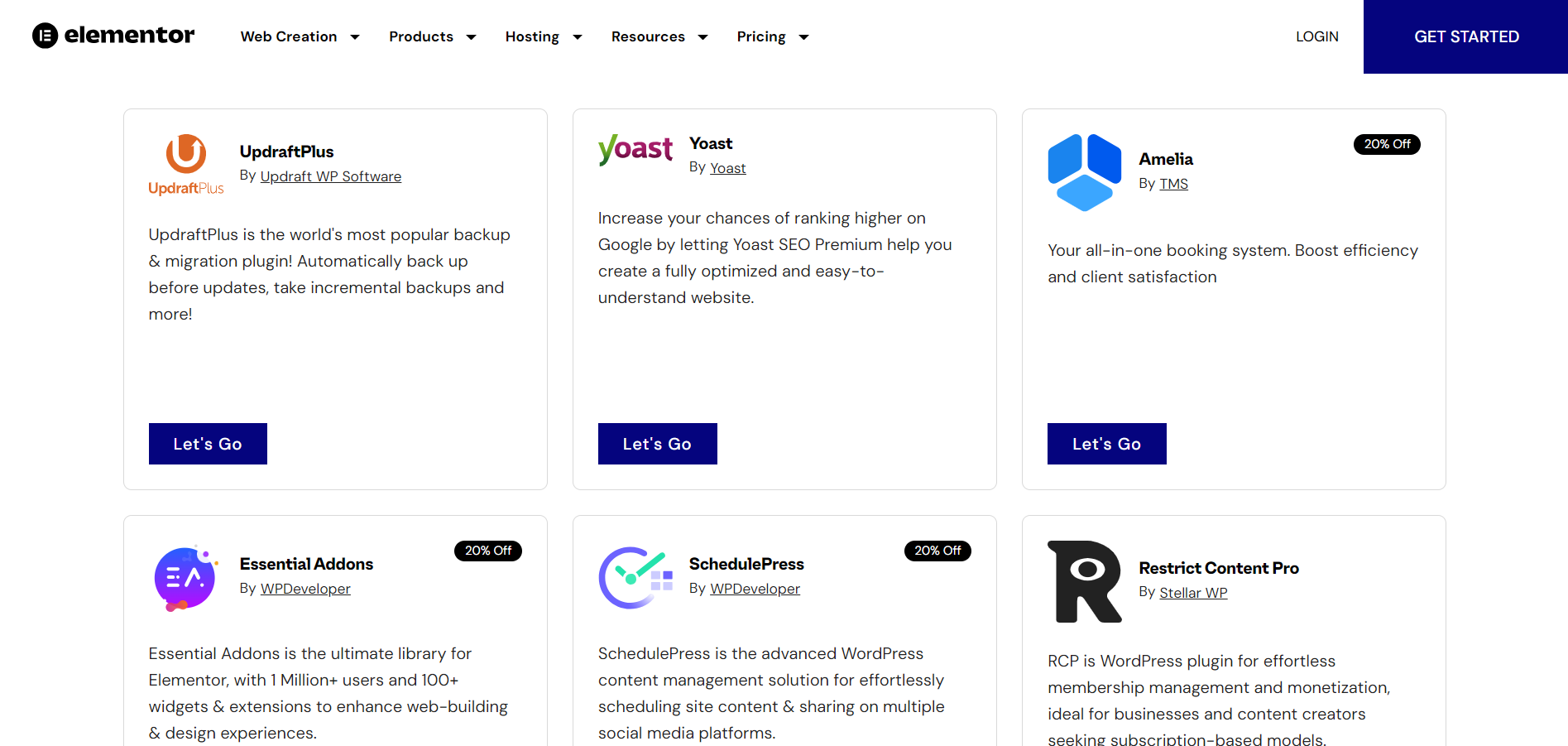
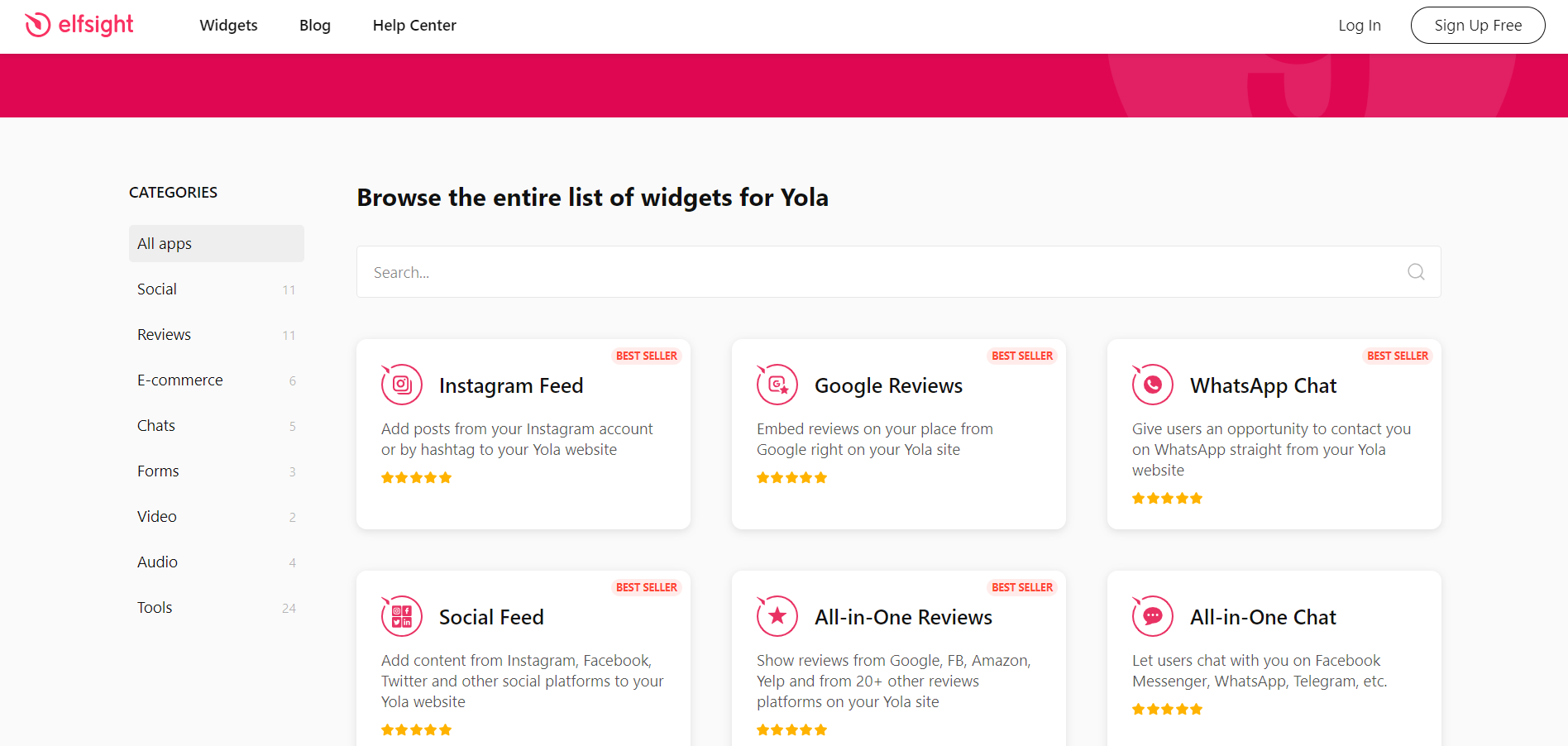
Marketing Features
Design FunctionalitiesRepresents how well each platform allows for creative design and customization of websites.Score Components:
- Template Variety (30%): Range and quality of design templates.
- Customization (30%): Flexibility and options for design alterations.
- User Interface (20%): Ease and intuitiveness of the design process.
- Responsiveness (10%): Adaptability to different devices and screen sizes.
- Innovation (10%): Unique design features and tools.
 7.8
7.8
 6.5
6.5
🏆
Overall Winner: Elementor
. Elementor stands out for its flexibility and integration with various marketing tools and plugins, making it a versatile choice for marketing. Yola, while offering a decent range of marketing features, is more suitable for individuals and small businesses.

|

|
|
|---|---|---|
|
SEO Tools |
Yes, with integration of various SEO plugins |
Yes, basic built in SEO tools |
|
Email Marketing |
Yes, with integration of various email marketing services |
Yes, available on higher plans |
|
Blogging |
Yes |
Yes |
|
Social Media Integration |
Yes, integration of social media buttons |
Yes |
|
Analytics and Reporting |
Yes, with integration of Google Analytics |
Yes, possibility to integrate Google Analytics |
|
Ads and Promotions |
Yes |
Yes, on higher plans |
Customer Support
Customer supportEvaluates the quality and availability of support options.Score Components:
- Response time (40%): Speed of support responses.
- Support quality (30%): Effectiveness and helpfulness of the support.
- Availability (20%): Range of support channels (phone, chat, email).
- Resource richness (10%): Quality of self-help and educational materials.
 7.2
7.2
 6.3
6.3
🏆 Winner: Elementor
. In the Elementor vs Yola comparison, Elementor takes the lead with its 24/7 live chat support and global customer experience agents. This ensures that users can get immediate assistance at any time, which is a significant advantage for those needing quick resolutions to their issues. Elementor’s support system is robust, providing help through ticketing and live chat, making it a reliable choice for continuous support.
Yola, on the other hand, offers 24/7 email support with priority responses for paid plan subscribers. While it does provide a call-you-back service and support via social media channels, it lacks the immediacy of live chat support. Yola’s support is commendable for its prioritization of paid users, but it falls short compared to Elementor’s round-the-clock live chat availability.
Security
SecurityLooks at the platforms’ security measures and data protection.Score Components:
- Data protection (40%): Safeguards for user and customer data.
- SSL and encryption (30%): Implementation of secure connections.
- Compliance (20%): Adherence to industry security standards.
- Regular updates (10%): Frequency of security updates and patches.
 9.1
9.1
 8.3
8.3
🏆
Winner: Elementor
. Elementor’s security score is slightly higher than Yola’s, indicating a more robust security infrastructure. Elementor leverages Google Cloud’s infrastructure for high security, including end-to-end encryption. It employs both active and passive security measures, including 24/7 monitoring, regular updates, backups, and specialized security protocols to protect against common threats. Elementor’s commitment to security is further emphasized by its ISO 27001 certification and a proactive Bug Bounty program, aimed at harnessing the community’s power for continuous security improvement.
Yola also prioritizes the security of users’ private data through encryption, access controls, and compliance with data protection regulations. It employs robust security measures including SSL encryption, DDoS mitigation, firewalls, regular software updates, data backup, and recovery, as well as security audits and testing to safeguard users’ websites. These measures help protect against various threats such as data interception, denial-of-service attacks, unauthorized access, and system vulnerabilities. By prioritizing security at multiple levels, Yola aims to ensure the integrity and availability of its users’ websites, mitigating risks and enhancing overall trust and reliability in their platform.
AI Capabilities
AI capabilitiesMeasures the effectiveness of AI-driven features and tools.Score Components:
- Automation efficiency (40%): Impact of AI on streamlining processes.
- Personalization (30%): AI-driven customization for users or customers.
- AI-Assisted design (20%): Role of AI in website design and functionality.
- Data analysis (10%): Use of AI in interpreting user data and analytics.
 7.4
7.4
 0.0
0.0

|

|
|
|---|---|---|
|
AI Builder |
Elementor’s AI builder generates text, custom codes, and images directly within the editor |
|
|
AI Ecommerce features |
Elementor’s AI tools support a complete suite for building every aspect of an online store |
|
|
AI Content Generation |
Elementor’s AI content generation capabilities enhance website creation on WordPress |
|
|
Additional AI features |
Elementor allows integration of many third-party AI powered WordPress plugins or widgets |
|
🏆 Winner: Elementor
. Elementor, with a score of 7.4, offers a range of AI capabilities that enhance the website creation process. These include an AI builder, AI-driven eCommerce features, AI content generation, and the ability to integrate third-party AI plugins. On the other hand, Yola, with a score of 0.0, does not have any AI capabilities.
User Management
User ManagementAssesses the platforms’ capabilities in managing user roles, permissions, and accessibility.Score Components:
- Role Customization (40%): Flexibility in creating and defining user roles and
permissions. - Ease of Management (30%): User interface and tools for managing users.
- Access Control (20%): Effectiveness of access control measures for different user
levels. - Scalability (10%): Ability to manage a growing number of users efficiently.
 8.8
8.8
 7.3
7.3
🏆 Winner: Elementor
. Both Elementor and Yola offer user management capabilities, but Elementor’s flexibility and integration with WordPress roles and permissions give it an edge.
- Elementor operates on WordPress, and the number of users who can edit or manage a website depends on the roles and permissions set within WordPress. Administrators have full access to edit any part of the site, including Elementor settings, while Editors can manage posts and pages made with Elementor. Authors and Contributors have limited capabilities. Elementor Pro offers a Role Manager feature, enabling further customization of what different roles can do within Elementor.
- Yola supports multi-user editing capabilities, allowing different levels of access and control based on the plan chosen. The primary account holder, often referred to as the Owner or Administrator, possesses comprehensive control over the website, including the ability to edit content, manage settings, and extend invitations to collaborators for website modification. Collaborators or Editors, invited by the account holder, can edit the website to varying degrees, which might range from content editing to page management, depending on the permissions granted by Yola’s platform.
Elementor User Roles and Access Levels:
| Role | Description | Access Highlights |
|---|---|---|
| Administrator | Users with full access to all administration features, including Elementor settings. | Can edit all content, Access to Elementor settings, Can install plugins and themes, Can manage users |
| Editor | Users who can manage and publish content including pages and posts. | Can edit pages/posts created with Elementor, Cannot access Elementor settings, Can manage categories, tags, and links, Can moderate comments |
| Author | Users who can publish and manage their own posts. | Can create posts with Elementor, Cannot edit pages, Limited access to media library, Cannot access Elementor settings |
| Contributor | Users who can write and manage their own posts but cannot publish them. | Can create content with Elementor, Cannot publish or edit pages, No access to Elementor settings, Submissions require review by higher-level roles |
Unfortunately, Yola does not provide a detailed breakdown of user roles and access levels.
Additional Features

|

|
|
|---|---|---|
|
SSL Certificate |
|
|
|
Custom Domain |
|
|
|
Free Custom Domain Included |
|
|
|
International Domains |
|
|
|
Mobile Responsive |
|
|
|
Page Speed |
|
|
|
Website Builder Mobile App |
|
|
|
Convert a Website To An App |
|
|
|
Website Analytics |
|
|
|
Multilingual Sites |
|
|
|
Multiple Users |
|
|
User Feedback
Elementor is widely appreciated for its intuitive drag-and-drop interface, enabling rapid creation of professional and responsive websites without coding skills. It offers a vast range of templates and compatibility with WordPress, making it a go-to for diverse users. Despite its benefits, concerns arise regarding website loading times, subscription costs, and occasional compatibility issues. Feedback on customer support and legacy plan management is mixed, with some users experiencing dissatisfaction. Overall, Elementor is valued for its efficiency in web development, although some aspects, particularly support services, could be improved.
Yola seems to have received mostly positive reviews. Users appreciate its professional templates, ease of use, affordability, and customer service. They find it ideal for website creation, especially for those without specialized knowledge. However, some users express dissatisfaction with aspects such as data security, customization limitations, and lack of certain features like chat support. Overall, Yola appears to solve the problem of easy website creation and maintenance for businesses and individuals, offering a range of templates and tools at a reasonable price point.
The making of this blog
We followed a clear, step-by-step process to write and research this article.
FAQ
Which platform is better for beginners, Elementor or Yola?
Can I use both Elementor and Yola for creating an ecommerce website?
How do Elementor and Yola differ in terms of customization and design flexibility?
What are the major differences in pricing and value between Elementor and Yola?
Which platform offers better customer support, Elementor or Yola?










